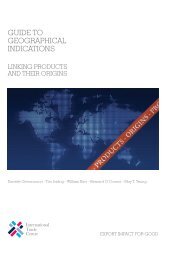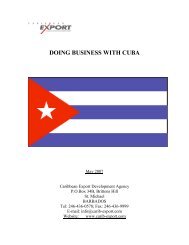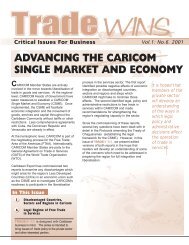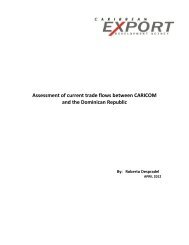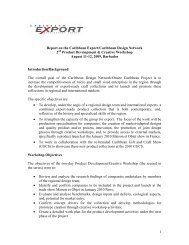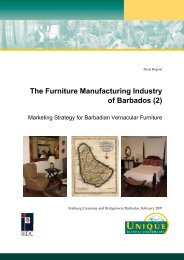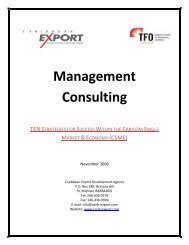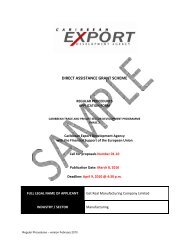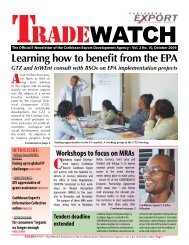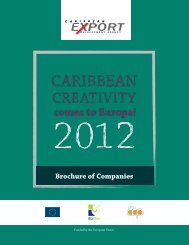Market Access Manual for Artisans Rev2 - Caribbean Export ...
Market Access Manual for Artisans Rev2 - Caribbean Export ...
Market Access Manual for Artisans Rev2 - Caribbean Export ...
Create successful ePaper yourself
Turn your PDF publications into a flip-book with our unique Google optimized e-Paper software.
� All goods and services furnished <strong>for</strong> the production of the merchandise which are not<br />
included in the invoice price. The invoice and all accompanying documents must be in<br />
English or accompanied by an accurate English translation. If the invoice does not<br />
indicate weights or measures of the merchandise, the importer must incur in the<br />
expense of obtaining this in<strong>for</strong>mation prior to the release of the shipment.<br />
If more than one invoice is included in the same entry, each document with its attachments can<br />
be numbered consecutively by the importer. No more than one distinct shipment from one<br />
consignor to one consignee by one commercial carrier can be included on the same invoice.<br />
7.3.2 PRO FORMA INVOICE<br />
This type of document is required whenever the invoice is not filed at the time of entry. If this is<br />
the case, a bond is given <strong>for</strong> production of the required invoice no later than 120 days from the<br />
date of the entry summary (or entry). If the invoice is required <strong>for</strong> statistical reasons, it should<br />
be produced within 50 days of the date of entry.<br />
A pro <strong>for</strong>ma invoice indicates in<strong>for</strong>mation that the importer may consider necessary to furnish<br />
Customs Officers at the time of the <strong>for</strong>mal entry. It must contain enough in<strong>for</strong>mation <strong>for</strong><br />
examination, classification and appraisal of the merchandise.<br />
7.3.3 FREQUENT ERRORS IN INVOICING<br />
<strong>Export</strong>ers must exercise extreme care when preparing the documentation to enter goods into<br />
the United States. Any mistakes or omission in the document, inaccurate in<strong>for</strong>mation or<br />
misleading statement presented to Customs in connection to an entry, may result in delays in<br />
the entry process or even detention of the goods. Even if the inaccuracy or omission was<br />
unintentional, the exporter is responsible <strong>for</strong> this and must prove it was not negligence on his<br />
part.<br />
It is important that absolutely all the in<strong>for</strong>mation pertaining to the import transaction is true<br />
and accurate. This in<strong>for</strong>mation is essential <strong>for</strong> Customs to establish the tariff status of the goods.<br />
Some of the most common inaccuracies to be avoided are:<br />
� Commissions, royalties or other charges are not included in the invoice because it is<br />
believed these are non‐dutiable.<br />
� An exporter, who purchases goods to export to the US, shows the cost of the goods in<br />
the invoice instead of the delivered price.<br />
� A <strong>for</strong>eign manufacturer produces goods with materials supplied by the US importer, and<br />
invoices at the actual cost to the manufacturer instead of including the value of the<br />
materials supplied by the importer.<br />
� Foreign manufacturer ships replacement goods to the importer in the US and invoices<br />
the goods at the net price instead of showing the full price less the allowance <strong>for</strong><br />
defective goods previously shipped and returned.<br />
� An exporter who sells the goods at a list price, less a discount, but invoices them at the<br />
net price omitting to indicate the discount.<br />
28<br />
Page 28



